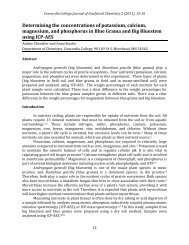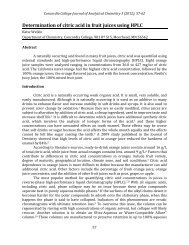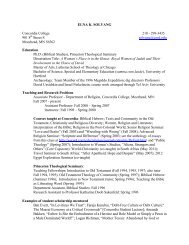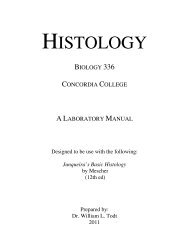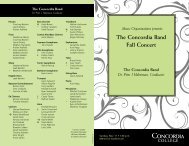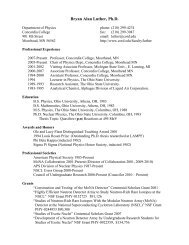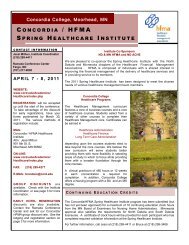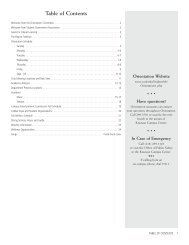Djembe - Concordia College
Djembe - Concordia College
Djembe - Concordia College
Create successful ePaper yourself
Turn your PDF publications into a flip-book with our unique Google optimized e-Paper software.
12<br />
Though there is much more that could be said about both mythical moments and magical<br />
touches, as well as practical means the children use to achieve responsibility, let us consider what<br />
the use of this universal myth to the particular Irish story might mean. When the children bring<br />
Papa home, they reconnect him with the Traveler community from which his repressed grief had<br />
severed him. Papa learns from his boys how to start anew. The children help Papa express his<br />
grief and let go of his inability to control life. They also teach him again the lessons of hope for<br />
the future, faith in the on-going nature of life, and joy in the moments of living and loving in the<br />
present. In short, these children bring Papa home again, mooring his soul so that he can return<br />
to who he is and resume the life of the Traveler. Let me suggest three conclusions that we might<br />
reach as we look at the film. At the Jungian universal level, the narrative may be seen as a heroic<br />
journey, in which the boys achieve individuation and move toward adulthood. At the level of<br />
practical reality, this film is a story about grief set in the context of today’s world in which all too<br />
often children are forced to grow up fast yet adults often behave like children. At the particular<br />
contextual level of Irish Travelers, the narrative does not allow the older generation to remain<br />
static in a nostalgic grief over a past dead and gone. Instead, the children help Papa and Grandpa<br />
Ward both let go and honor that past, keeping it alive in healthy ways for the present and the<br />
future. The Irish Travelers, like the arc of this film, are on a never-ending journey that will hold<br />
both sorrow and joy—for it is the human condition. Once we all accept that much, we can feel at<br />
home on this earth and in our own skin, no matter where we journey.<br />
Works Cited<br />
Attig, Thomas. “Relearning the World: Always Complicated, Sometimes More Than Others.”<br />
Complicated Grieving and Bereavement: Understanding and Treating People<br />
Experiencing Loss. Eds. Gerry R. Cox, Roberta A. Bendiksen, and Robert G.<br />
Stevenson. Amityville, NY: Baywood, 2002. 7-19.<br />
Campbell, Joseph with Bill Moyers. The Power of Myth. New York: Anchor Books, 1991.<br />
Cirlot, J.E. A Dictionary of Symbols. New York: Dorset Press, 1971.<br />
Irwin, Chris. “Horses Help with Human Psychotherapy.” Brain Injury Resource Foundation.<br />
Accessed 20 July 2008.<br />
Kane, Sean. Wisdom of the Mythtellers. Ontario: Broadview Press, 1994.<br />
Lamers, Elizabeth P. “Helping Children During Bereavement.” Dying, Death, and Bereavement:<br />
A Challenge for Living. 2nd Edition. Edited by Inge Corless, Barbara B. Germino, and<br />
Mary A. Pittman. New York: Springer, 2003: 267-286.<br />
Leeming, David Adams. “Introduction: The Dimensions of Myth.” The World of Myth. New<br />
York: Oxford UP, 1990: 3-9.<br />
McCarthy, Conor. Modernisation, Crisis, and Culture, 1969-1992. Dublin: Four Courts Press,<br />
2000.<br />
McLoone, Martin. Irish Film: The Emergence of a Contemporary Cinema. London: British Film<br />
Institute, 2000.<br />
Newell, Mike. Dir. Into the West. Starring Gabriel Byrne. Channel Four Films. 1992.



